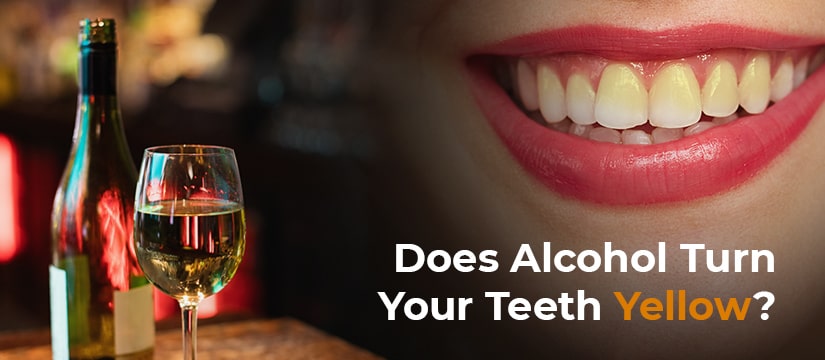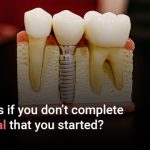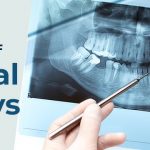While moderate drinking (one drink for women and two for men) might not significantly impact the teeth, it is important to be aware of the risks associated with excessive drinking. People who abuse alcohol have higher plaque levels and an increased likelihood of periodontal disease, tooth decay, tooth loss, and mouth sores. Furthermore, alcohol abuse increases your chance of oral cancer and teeth discolouration. Here are some of the negative effects excessive consumption of alcohol has on your teeth.
- Yellow Teeth
Does alcohol turn your teeth yellow? Unfortunately, the answer is yes. According to studies, heavy drinking can cause tooth discolouration, including yellowing. The process is called demineralization, and it happens when alcohol breaks down the enamel on your teeth, exposing the inner layer known as dentine. Over time, this can lead to cavities and a yellowish colour forming on your teeth.
To prevent this from happening, make sure to drink in moderation and avoid drinking alcoholic beverages with high sugar or acid levels. If you do experience tooth yellowing from drinking, make an appointment with your dentist to discuss solutions.
- Sugar Content
Drinking sugary drinks, like alcohol, helps the bacteria in your mouth to thrive. These bacteria create acids that cause tooth decay by eating away at your teeth and destroying the enamel. The better choice is to sip on a drink with less sugar, such as dry wine.
- Dry mouth
Most people know that alcohol can dehydrate the body, but did you know that it can also dehydrate your mouth tissues? Alcohol consumption can deprive your mouth of moisture, which in turn can cause dry mouth. Symptoms of dry mouth include a decrease in saliva production and a build-up of plaque and bacteria on your teeth.
Saliva is important because it helps dissolve food particles in your stomach, which helps you digest foods. When saliva production decreases, food residue can get stuck between your teeth, forming plaque. This can cause the bacteria in plaque to start eating your enamel, exposing the dentine, which assumes a yellowish colour.
This is why it’s important to keep a healthy oral hygiene routine – including brushing and flossing – even if you don’t drink alcohol regularly. Additionally, make sure to drink plenty of water throughout the day to offset the effects of dehydration.
Bottom Line
Does alcohol turn your teeth yellow? The simple answer is yes; in fact, it can actually do this quite noticeably. When you drink alcoholic beverages, the act of consuming alcohol breaks down the enamel on your teeth, as mentioned above. This process happens over time as you drink more and more, and as a result, your teeth’ yellow colour becomes more evident.
This change is harmful to your teeth and can permanently damage tooth enamel if left unchecked. If you’re concerned about how your drinking affects your dental health, it’s important to talk to us at Carrum Downs Dental Clinic about the steps you can take to mitigate the effects of alcohol on your oral health.


